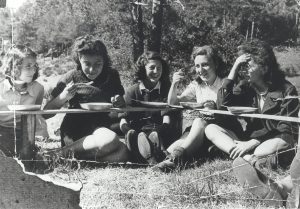16 and 17 July 1942, the Vel d'Hiv roundup

In July 1945, the children of the house of Moissac are in a summer camp in Chambon-sur-Lignon.
Annette is the 3rd person on the left.
Memorial of the Shoah/Coll. EEIF
On 16 July 1942, at 4 o'clock in the morning, the largest round-up targeting the Jews of France during the entire Second World War was launched by the Paris police prefecture, at the initiative of the Nazi authorities. More than 4500 police officers are mobilized. Dozens of buses are required from the Compagnie du Métropolitain to transfer the arrested Jews. The persons concerned are German, Austrian, Polish, Czechoslovakian, Russian and stateless Jews. 12,884 people are arrested, at their homes in Paris and the nearby suburbs, during the two days of July 16 and 17, including a large number of women and children, although French. The arrests continue until 20 July, bringing the total to 13,152 people.
Single people and couples without children are sent to Drancy. The families, 8,160 people including 4,115 children, are locked up at the Vélodrome d'hiver in the 15e arrondissement, parked on the bleachers in terrible conditions. Between 19 and 22 July, these families were transferred to the camps in Loiret, at Pithiviers and Beaune-la-Rolande, then gradually deported to the Auschwitz-Birkenau camp. 3000 children are brutally separated from their loved ones because Berlin has not yet authorized their deportation, requested by Laval. The agreement is given on August 13. 4464 internees from Loiret, including 3081 children, are then transported to Drancy and, for the greatest number, immediately deported and murdered.
Of these tragic events, there is only one photograph identified by Serge Klarsfeld in 1990, showing buses parked in front of the Vel d'Hiv.
Video of the testimony of Annette, 10 years old on July 16, 1942
In her testimony, she mentions the conditions of internment at Vel d'hiv, at Pithiviers and then at Drancy.
Annette Wainstein Landauer was born on September 14, 1931. She lives with her father Nuchim Wainstein, her mother Ruchla and her brother Sirins in Paris on the 18the arrondissement. On July 16, 1942, she is arrested with her father and brother. Her mother Ruchla Corenvit is not arrested, bearing the same name. They are taken to the Vélodrome d'Hiver then into barracks at the camp of Pithiviers. First transferred alone to Drancy, she is joined by her father and brother. In her testimony, she mentions the conditions of internment at Vel d'hiv, at Pithiviers and then at Drancy. His mother obtains the release of the whole family thanks to their Romanian nationality which at that time becomes part of the protected nationalities. Two years of clandestinity follow. His mother, who had not been taken prisoner at the time of the roundup of Vel’ d'hiv, was unfortunately arrested and deported in June 1944 by convoy 76 on 30/06/1944.
Annette learns in September 1944 that her mother will not return. Her father, unable to take care of her, sends her to Moissac, a children’s home for the Scouts Israélites of France, where she meets her brother until August 1946.
Annette Landauer died in March 2021.

